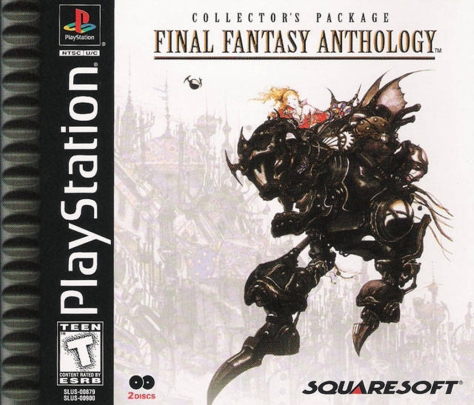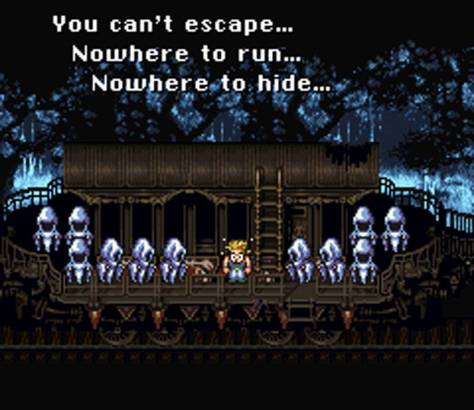
I don’t want this review to sound too acrimonious, but I had a lousy experience with Final Fantasy VI. It’s a game I started a couple of times over the past few years, only to burn out early on. By the time I began playing this game, soon after completing the two prior entries, I suffered from a Final Fantasy fatigue. With a few years between my last attempts, I finally restarted this summer and managed to beat it. While I enjoyed much of my playthrough this go-around, my impressions were still negatively colored by those initial burnouts, especially after listening to years of praise for this entry, often cited as the greatest in the series. Opinions are malleable, and mine will undoubtedly grow rosy with the passing of time, but as of this writing I feel this is the weakest Final Fantasy on the Super Nintendo.
To be clear, when I say the weakest, I don’t necessarily mean the worst. It’s hard to argue that this entry isn’t the best SNES era Final Fantasy. After all, it took the progressive storytelling and character development from Final Fantasy IV and the addictive combat and class mechanics from Final Fantasy V and incorporated them into a single package. What I mean when I say weakest I suppose, is that Final Fantasy VI was less impactful, than those entries. Yes, it does everything its predecessors did, and better, but I’ll still give those games more credit since they did them first, albeit, separately.

Regarding the narrative, this entry was a course correction for the series after the step backward the previous game took. Taking place in a steampunk setting a thousand years after a magic-fueled war nearly wrought the end of the world, a militaristic empire has risen to power by fusing the remnants of magic with advanced machinery. The cast featured about a dozen fleshed out protagonists from different walks of life, united in their opposition to the Empire and the maniacal Kefka, an insane general who eventually murders the Emperor Gestahl and thrusts the world into chaos. He’s often referred to as one of the best villains in the series and I’d have to agree with that opinion.
New party members were steadily introduced over the course of the game and narrative events frequently required the party to split up into multiple groups. At any given time the party was limited to four so these situations forced me to use characters I’d otherwise ignore. Besides serving as pivotal storytelling gambits, these situations allowed me to grow comfortable and strengthen each party member. This was beneficial during the post-apocalyptic third act. After Kefka obtained power, the party was broken apart and I scoured the world to reunify them, locating them one by one and participating in sidequests that provided more detail about each character, like the loyalty missions in Mass Effect 2. Finally, they stormed Kefka’s Tower in three groups, necessitating the use of practically every character I’d come across.

Although I had favorite characters to play as, I relished the opportunities to grind and customize each member of the party. As well as improving standard stats by leveling up and acquiring better gear, every party member could learn various magic spells by equipping Magicite, the crystalized essence of Espers. For instance, the Magicite Ramuh would teach Thunder, Thundara, and Poison at learning rates of x10, x2, and x5 respectively. These rates were multiplied by the amount of battle points awarded after each fight and once a spell reached one hundred points, it was bestowed upon the character.
In addition to teaching magic spells (and giving the ability to summon Espers), some Magicite also offered level-up bonuses. As an example, when a character leveled up with Ramuh equipped, they were granted a +1 boost to their stamina. The combination of teaching magic spells and offering level-up bonuses had me micromanaging my party to a ludicrous degree. I kept a watchful eye over each party member’s equipped Magicite so no battle points went to waste. I’d also pay attention to their experience so when they neared a level-up, I could equip them with the Magicite that would award the most suitable level-up bonus. In the pursuit of optimization I was navigating the menus after almost every battle, but I never tired of the, admittedly tedious, process. The nitty-gritty customization systems in this game are akin to the ones that make me think so highly of Final Fantasy V, XII, and Lost Odyssey and are partially why I actually looked forward to grinding.

While many of the random battles were straightforward affairs in which I could simply overpower my foes, boss fights called for a greater reliance on strategy. Just as the party splitting up forced me to utilize characters I generally wouldn’t have, boss fights regularly had me experimenting with different tactics to outsmart my opponent. In one such fight, I had an “aha!” moment that typified many other encounters.
I was battling an optional dragon boss that used devastating ground-based attacks and getting nowhere. After a few attempts, I knew the party was strong enough to defeat the dragon but they couldn’t survive the barrage of attacks. Playing around with different magic caused the dragon to cast Gravity on the party. This struck me as odd, since Gravity nullified the effect of Float… All of sudden it dawned on me! If the party member’s used Float, they’d avoid the ground-based attacks of the dragon! Taking it one step further, I equipped everyone with a Relic that granted a version Float that wouldn’t be dispelled by Gravity and voila, they handily won!

These boss fights were especially fun while playing with a partner, which the three SNES era games allowed for. My friend aided me in Kefka’s Tower, fighting some of the toughest enemies and bosses in the game. Working together, calling out moves, targets, and strategizing only served to amplify the fun of battles. In one of our final battles, after nearly vanquishing a boss, it restricted our party so badly that our only viable method of victory was literally a gamble: Setzer’s Slots attack. The rest of the fight was a tightrope act, always on the cusp of failure, but we reigned victorious in the most exhilarating battle of the game, more so even than my victory over Kefka. In retrospect, I should’ve used this feature much more. It’s disappointing I won’t have that ability going forward since these were so fun to play with another person.

Now that it’s time to recap, I suppose this review wasn’t too acrimonious after all. In fact, as I was writing, I could only think of how great the narrative, combat, and gameplay systems were, despite the rough starts that still cloud my opinion. Whereas the two prior entries introduced a genre defining narrative and an addictive class system, Final Fantasy VI merely unified these ideas, perhaps perfecting a formula. In a sense, this game brought nothing new to the genre while its predecessors had a qualitative impact. For that reason, this is simultaneously the best, and the weakest Final Fantasy on the Super Nintendo.

I’ll be honest, VI is my favourite by far. It is the only one where I liked all the protagonists, and man, Kefka was badass!
I get what you mean about FF burnout, I originally played to do 1-10 in order, and I I simply can’t bring myself to do it. Did 1, 2 then 6, and just can’t fill in the gaps. Took me 18 months to then do 9 and 10.
LikeLiked by 1 person
While writing this, I realized how much I enjoyed the story and systems of VI. The process has got me excited to play VII, so I’m thinking I’ll last at least one more game before burning out again.
LikeLiked by 1 person
VII was always my favourite. Kinda avoiding it on my site
LikeLiked by 1 person
I can see how you might have a lower opinion of this after playing other Final Fantasies in a row. I also played FFIV and FFV before this, though I thought FFVI was the best. I see your points that FFVI didn’t advance games as much as FFIV, which introduced the story template for FF for years to come. However, it did have some radical departures like a female protagonist (or two), a winning maniacal villain, and having to regroup a split-up party as optional sidequests. It was a great ride, and I loved all the characters in it. It’s not my favorite FF, but it’s up there.
LikeLiked by 1 person
It’s easily the best of the SNES trio. I’m interested in replaying these three with a friend to see how my opinions shift.
LikeLiked by 1 person